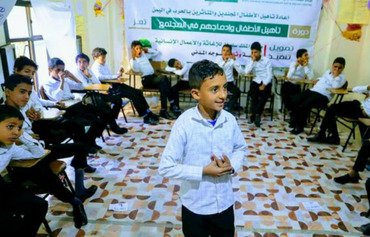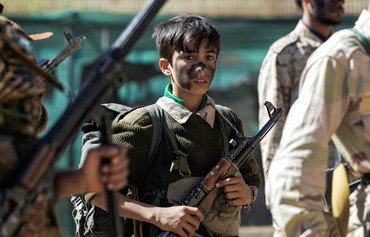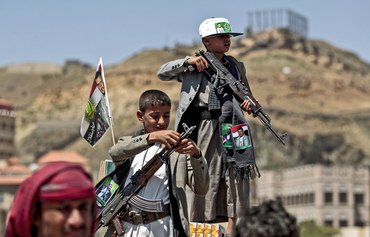Criticism of the Houthi (Ansarallah) militia is mounting over its continued recruitment of children to bolster its ranks at the battlefronts.
Following local and international criticism of the militia's recruitment of children, Houthi leader Abdul Malik al-Houthi issued a directive to his followers on November 15th ordering them not to publish any photographs of dead child recruits, the Asharq Al-Awsat newspaper reported.
Yemeni Minister of Human Rights Mohammed Askar said the ministry will include the directive in the dossier it will present to international human rights organisations on the Houthis' exploitation of children in military operations.
"The militias think that banning the publication of photos would alleviate the criticism directed at them," Askar said.
The Ministry of Human Rights has tracked up to 4,000 cases of child recruitment, he said, which represent a sample of the total number of child soldiers fighting in the militias’ ranks.
Based on the number of battlefronts, the ministry estimates the total number of child soldiers fighting with the Houthis at 20,000 children, he added.
In June, the Yemeni government said it would set up a rehabilitation centre in the temporary capital, Aden, to care for captured Houthi child soldiers.
"The government is hammering out the final details of the rehabilitation centre in Aden in view of the recent surge in child recruitment," Askar had said in statements to the press.
The number of child soldiers recruited in Sanaa alone has risen to 10,000, he said.
Meanwhile, the Yemeni Coalition to Monitor Human Rights Violations (YCMHRV) said in June that 400 children recruited by the Houthi militia have been killed in the war since 2015.
This was announced at a symposium held by the YCMHRV at the UN Human Rights Council headquarters in Geneva.
"The number of child soldiers killed in the fighting is 424, and 16 others were permanently disabled," said Riyad al-Dubai, YCMHRV official in charge of the Monitoring and Documentation Unit.
He called on the Houthis to "discharge all child soldiers in their ranks, shut down the training and recruitment centres, admit their responsibility and compensate the victims".
Various recruitment methods
"The Houthis sought to destroy education and shut down schools to improve their chances in recruiting children," lawyer and human rights activist Abdul Rahman Barman told Al-Mashareq.
The youth minister in Yemen's Houthi government, Hassan Zaid, on October 20th proposed suspending school classes for a year and sending students and teachers to the front.
"Yemeni society vehemently rejects the recruitment of children," Barman said, noting that the Houthis are targeting and recruiting children without the knowledge of their parents.
"We have seen child soldiers under the age of 10, while international law criminalises the recruitment of children under the age of 18," he said.
The Houthis are taking advantage of the children’s lack of awareness of the risks associated with their recruitment and subject them to brainwashing and indoctrination courses, he said.
They also have used financial incentives to persuade some parents to let their children join the militia's ranks, he said.
They tell the parents that "their children will be recruited to guard civilian installations or to man checkpoints, but they ultimately end up fighting on the front lines and face death", Barman said.
The Houthis also use narcotic pills to make child recruits "brave and unafraid of death", he added.
"Some of the captured [child fighters] we have seen kept repeating the slogans they learned from the Houthis for up to 18 hours after their arrest," he said.
"However, once the effect of the narcotics has worn off, the children would return to their senses and show remorse," he said.
Gang style
"The Houthis are following the path of gangs and terrorist groups which rely on children and adolescents [in their recruitment]," said political researcher Yassin al-Tamimi.
The tactic involves reshaping the children's thinking in order to drive them to kill and commit acts of terrorism, he told Al-Mashareq.
"The militia is suffering defeats and sustaining heavy losses in the military confrontations, driving older, more mature youth away from joining its ranks as they see it as a huge risk and a losing proposition on every level," he said.
As a result, the militia has been focusing its recruitment efforts on children, and using pressure and intimidation to coerce tribes into allowing their children to join its ranks, he added.
"The Houthis are finding it easy to attract and recruit children, trick them and thrust them into the battles, from which they cannot leave or escape," political analyst and writer Rashad al-Sharaabi told Al-Mashareq.
They prevent the children from leaving the battle fronts by threatening to kill them, he said, adding that some children who fled were pursued to their homes and villages.
"I know children from Taiz who were lured, deceived, sent to a training centre in Dhamar province and subjected to brainwashing," he said.
Their telephones were confiscated and they were prevented from communicating with their families, al-Sharaabi said.
Hundreds of children fighting with the militia have been captured by government forces and hundreds of bodies of children who fought in its ranks have been found, he said.
He added that the Houthis include child soldiers in their military parades and use them to man checkpoints.
"They have even reached the point of using them as tools in surveillance and mine-detection operations on many fronts," he said.

![A newly recruited teenage Houthi fighter takes part in a gathering in Sanaa to mobilise more fighters to battlefronts on February 2nd. [Mohammed Huwais/AFP]](/cnmi_am/images/2017/11/28/10482-Yemen-Sanaa-child-600_384.jpg)






